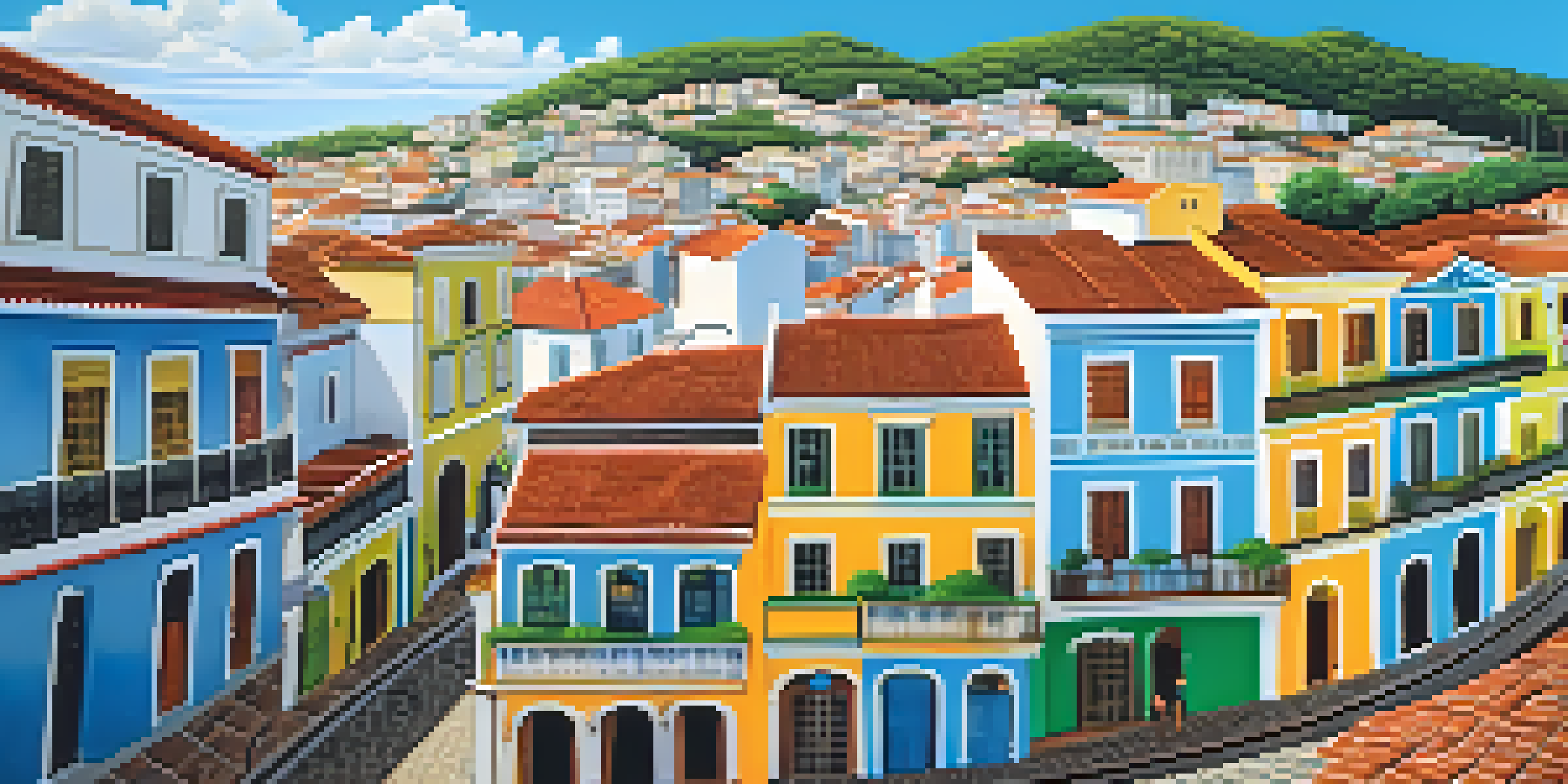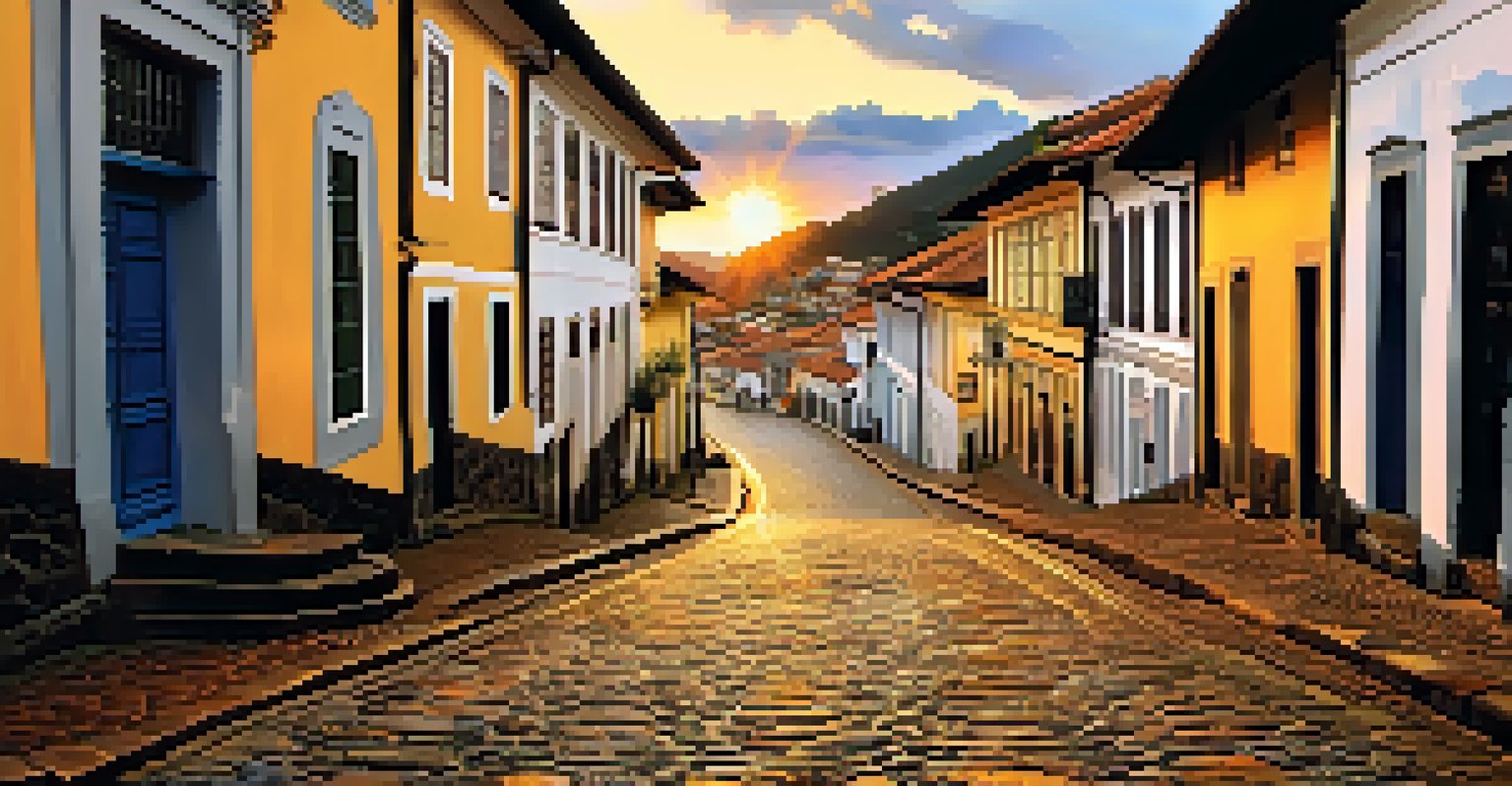Discovering Brazil's Colonial Heritage: The Historic Routes

Introduction to Brazil's Colonial Heritage
Brazil's colonial heritage is a tapestry woven with diverse cultures, traditions, and histories. From the arrival of the Portuguese in the 1500s to the influences of African and Indigenous peoples, this rich past shapes the country's identity today. Understanding this heritage not only enriches your travel experience but also provides insight into Brazil's vibrant present.
Brazil is a country with a rich history and a vibrant culture that reflects its colonial past.
As you embark on your journey through Brazil, you'll find that the historic routes are more than just paths; they are stories waiting to be discovered. Each city, town, and landmark holds a piece of the colonial puzzle, showcasing the architectural styles, customs, and everyday lives of people from centuries ago. This exploration invites you to walk in the footsteps of history.
In this article, we will delve into several key historic routes across Brazil, highlighting how they reflect the country's colonial legacy. From the cobblestone streets of Ouro Preto to the coastal charms of Salvador, each destination offers a unique glimpse into the past that continues to resonate today.
The Gold Trail: A Journey Through Minas Gerais
The Gold Trail, or Estrada Real, is one of Brazil's most famous historic routes, connecting the rich gold mining towns of Minas Gerais. This route takes you through picturesque landscapes dotted with colonial architecture that tells the story of the gold rush in the 17th and 18th centuries. Cities like Ouro Preto and Tiradentes are highlights, showcasing stunning baroque churches and charming plazas.

As you wander these towns, you'll notice the intricate tile work and ornate facades that reflect Portuguese influences. It's as if time stands still, allowing visitors to appreciate the craftsmanship of the past. Local museums, artisan shops, and cafes enhance the experience, making the Gold Trail a blend of history and modern charm.
Colonial Routes Reflect Diverse Heritage
Brazil's historic routes showcase the rich tapestry of cultural influences from Indigenous, African, and Portuguese traditions.
This route not only reveals the wealth that fueled Brazil's growth but also the struggles and stories of those who lived here. By exploring the Gold Trail, you gain a deeper appreciation for the cultural richness that defines Brazil today, rooted firmly in its colonial history.
Salvador: The Heart of Afro-Brazilian Culture
Salvador, the capital of Bahia, is a vibrant city that serves as a cornerstone of Afro-Brazilian culture. Founded in 1549, it was once the first capital of Brazil and remains a significant site for understanding the intersection of African and Portuguese influences. The historic Pelourinho district, with its colorful buildings and lively atmosphere, is a UNESCO World Heritage site that encapsulates the city's colonial past.
To understand Brazil, you must embrace its diverse heritage, which is a blend of Indigenous, African, and European influences.
Walking through Pelourinho, you'll encounter stunning churches, such as the Church of São Francisco, adorned with gold leaf and intricate carvings. The blend of African rhythms, religions, and culinary traditions makes Salvador a feast for the senses. Festivals, such as Carnaval, showcase the city's rich culture, drawing visitors from around the globe.
Exploring Salvador offers a unique opportunity to witness how colonial history has shaped contemporary Brazilian identity. The city's music, dance, and cuisine are reflections of its diverse heritage, making it a must-visit destination on your journey through Brazil's historic routes.
Paraty: A Preserved Colonial Gem
Paraty is a small coastal town that perfectly preserves its colonial charm, making it a delightful stop along Brazil's historic routes. Established in the 16th century, Paraty was once a crucial port for gold and sugar trade. Today, its cobblestone streets, whitewashed buildings, and vibrant cultural scene attract history enthusiasts and nature lovers alike.
The town's historic center, with its colonial churches and colonial mansions, offers a glimpse into Brazil's past. It’s easy to get lost in the beauty of Paraty, where every corner presents a picturesque view. The surrounding natural beauty, including stunning beaches and lush mountains, adds to the allure, inviting outdoor adventures.
Salvador: Hub of Afro-Brazilian Culture
Salvador serves as a vibrant center for Afro-Brazilian culture, blending history, music, and culinary traditions.
Paraty also hosts numerous cultural events, such as the International Literary Festival, where literature meets the town's rich heritage. By visiting Paraty, you not only explore a well-preserved colonial town but also engage with the ongoing narrative of Brazil's vibrant culture.
The Route of the Jesuits: Spiritual and Cultural Legacy
The Route of the Jesuits takes you back to the 16th century, highlighting the influence of Jesuit missionaries in Brazil. This route encompasses several key sites, including São Paulo and the ruins of the Jesuit missions in the south. It presents a unique perspective on the intersection of faith, education, and colonialism in shaping Brazilian society.
As you travel along this route, you'll discover the enduring legacy of Jesuit architecture, with many churches and educational institutions reflecting their commitment to education and culture. The well-preserved ruins of the missions, such as those in São Miguel das Missões, tell the story of the Jesuits' efforts to evangelize and educate Indigenous populations.
Exploring the Route of the Jesuits provides a deeper understanding of the complexities of Brazil's colonial history. It invites reflection on the cultural exchanges that occurred during this time and how those exchanges continue to influence Brazilian society today.
Historic Cities of Pernambuco: Olinda and Recife
The historic cities of Olinda and Recife in Pernambuco are a treasure trove of colonial history, showcasing Brazil's rich cultural tapestry. Olinda, a UNESCO World Heritage site, is known for its vibrant streets filled with colorful colonial houses and baroque churches. Its hilltop location offers stunning views of the surrounding area, making it a picturesque destination.
Recife, often referred to as the 'Venice of Brazil,' complements Olinda with its canals and bridges, reflecting the influence of Portuguese architecture. Here, you can explore historic districts, cultural centers, and lively markets, offering a taste of local life and traditions. The blend of history and modernity makes these cities a fascinating stop on your journey.
Modern Identity Rooted in History
Brazil's contemporary cultural identity is deeply influenced by its colonial past, shaping its music, dance, and cuisine.
Visiting Olinda and Recife allows you to immerse yourself in the unique blend of Afro-Brazilian culture, music, and cuisine. The vibrant festivals, including Carnival, showcase the cities' rich heritage, inviting travelers to engage with the lively spirit of the region.
The Impact of Colonial Heritage on Modern Brazil
Brazil's colonial heritage is not just a thing of the past; it profoundly impacts the country's modern identity. The architectural styles, cultural practices, and even the cuisine reflect the diverse influences of its colonial history. As you explore historic routes, you'll notice how this heritage continues to shape contemporary Brazilian life.
For instance, the fusion of Indigenous, African, and Portuguese traditions creates a unique cultural landscape that is celebrated in music, dance, and festivals. This blend is evident in genres like samba and bossa nova, which are integral to Brazil's cultural identity. The country's culinary scene, rich with flavors and techniques from its colonial past, is a testament to this ongoing influence.

By understanding Brazil's colonial heritage, you gain a deeper appreciation for the complexities of its society today. It highlights the resilience of its people and their ability to celebrate and preserve their diverse cultural roots, making every journey through Brazil a rich and enlightening experience.
Conclusion: Embrace the Journey Through History
Exploring Brazil's historic routes is not just about visiting landmarks; it's about embracing the stories and cultures that have shaped this vibrant nation. Each route offers a unique perspective on the colonial past, inviting travelers to connect with the history and heritage that define Brazil. Whether you’re wandering the streets of Olinda or marveling at the architecture of Ouro Preto, every moment is a chance to learn and reflect.
As you embark on this journey, take the time to engage with local communities, savor traditional dishes, and participate in cultural events. These experiences will enrich your understanding of Brazil's diverse identity, rooted in its colonial history yet ever-evolving. It's a reminder that history is not just a series of events but a living narrative that continues to unfold.
In conclusion, Brazil's historic routes offer a captivating exploration of its colonial heritage. By immersing yourself in these stories, you not only discover the past but also gain insight into the vibrant culture that thrives today. So pack your bags, hit the road, and let the journey through Brazil’s colonial heritage inspire you.